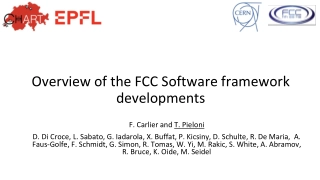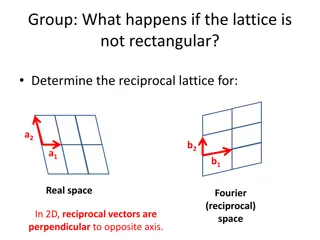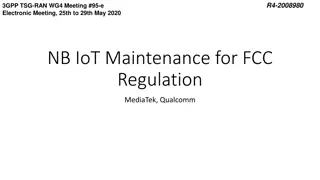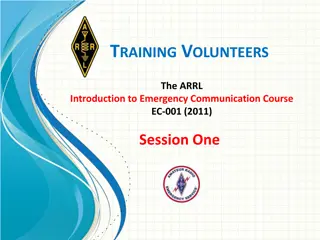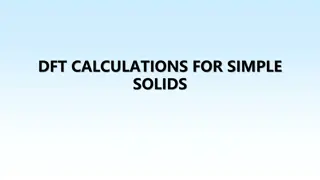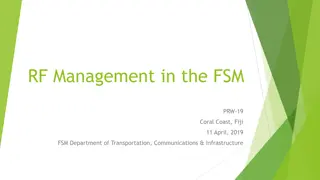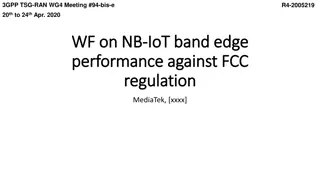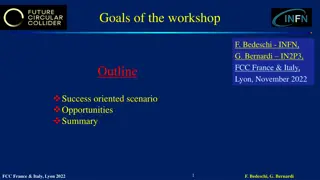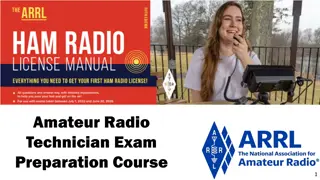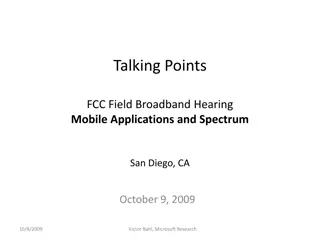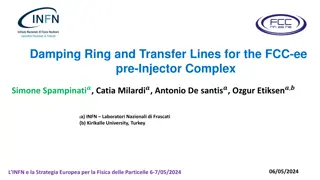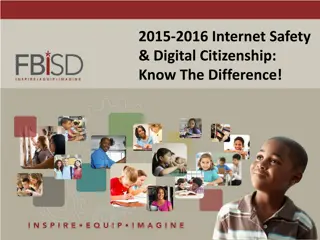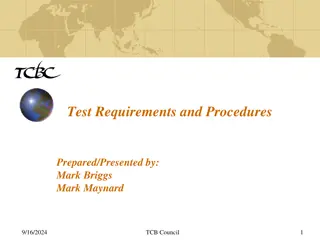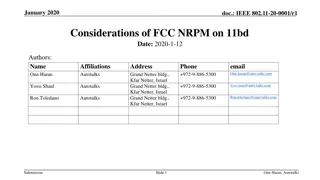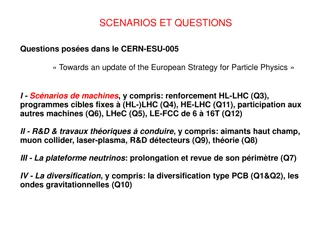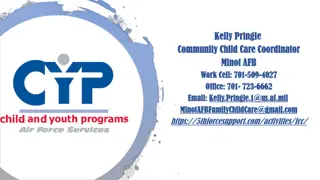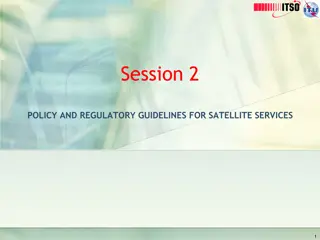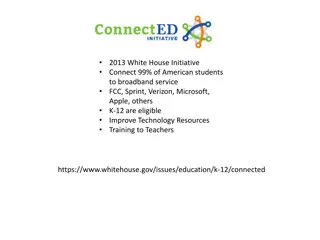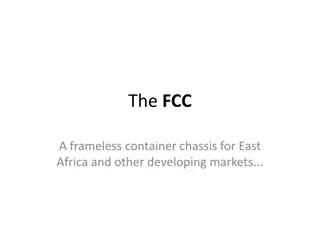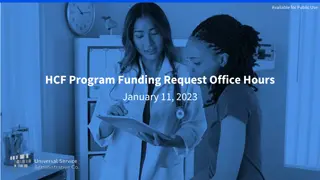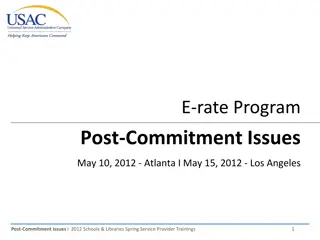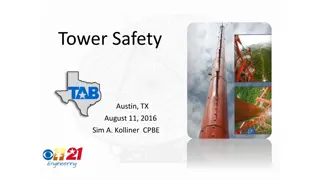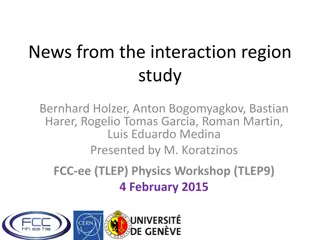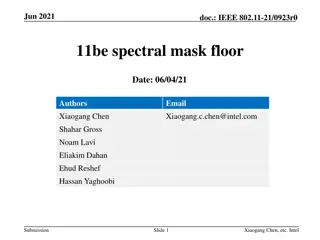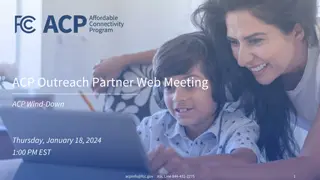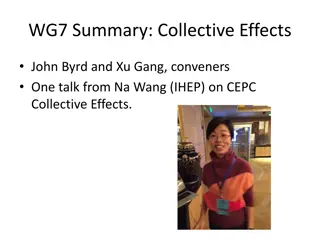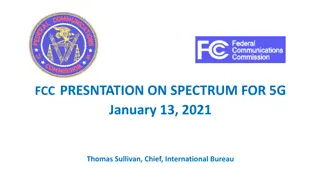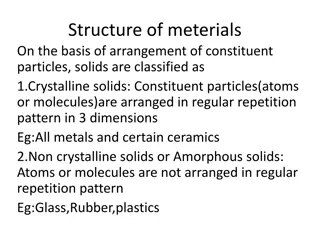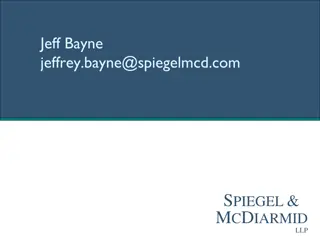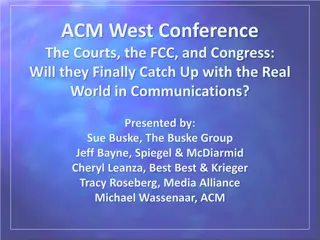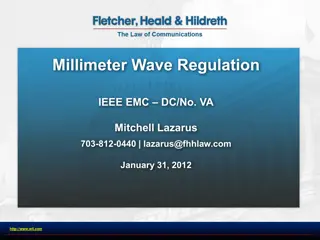Overview of the FCC Software framework developments
Overview provides information on the developments of the FCC Software Framework (SF) project, including modular software design and simulation capabilities for the Future Circular Lepton Collider (FCC-ee). It covers topics such as beam-beam interactions, lattice descriptions, beam lifetime studies,
1 views • 24 slides
FPC & HOM Technology Challenges, FCC
The challenges and technology involved in coupling beam power out of the cavity and coupling RF power into the cavity for the Future Circular Collider (FCC). It also covers the RF layout for the FCC-ee, basic parameters for proton and electron beams, accelerating RF in the LHC, input couplers, and p
0 views • 36 slides
Electrical Distribution Concept and Layout at FCC Week
Presentation at FCC Week 2022 focused on load requirements, high voltage network scheme, downstream electrical distribution for various points, and a preliminary load flow analysis. The update on load requirements includes P sizing, updates on RF systems, preliminary load surveys, and separation of
0 views • 15 slides
Important Notices and Services for Cottrellville Township Residents
Stay informed about upcoming board meetings, yard waste collection, dog license renewals, water billing, town planning initiatives, and FCC complaint procedures in Cottrellville Township. Access essential contact information and services to address various needs as a resident.
1 views • 8 slides
Understanding Crystal Structures and Types of Solids in Materials Science
Crystal structures in materials science involve the arrangement of atoms in solids, with examples of crystalline and amorphous solids like metals and glass. Explore concepts like energy packing, definitions of crystalline materials, unit cells, BCC and FCC lattices, HCP structures, and Miller Indice
10 views • 12 slides
New ILD Strategy: Consequences on ILD Tracking and Momentum Resolution
The ILD collaboration is adapting its strategy for potential circular colliders like FCC or CEPC, discussing challenges in tracking distortion correction, momentum resolution requirements, and handling various backgrounds. The focus is on optimizing the ILD design to meet the evolving collider lands
0 views • 11 slides
Understanding Reciprocal Lattices in Crystal Structures
Explore the concept of reciprocal lattices in crystal structures, including non-rectangular lattices, Fourier space in 2D, Wigner-Seitz cells, Brillouin Zones, and the relationship between BCC and FCC structures. Learn about primitive lattice vectors, construction of the Brillouin Zone, and the sign
0 views • 49 slides
FCC Regulation Conformance for NB-IoT Maintenance Discussion
Discussion on FCC regulation aspects related to NB-IoT maintenance, including proposed solutions and concerns from UE and network vendors. Topics include channel restrictions, NS usage, and potential modifications to meet FCC conformance requirements for NB-IoT operation. References provide addition
0 views • 5 slides
Understanding Emergency Communication Systems for Volunteer Training
This content covers various topics related to emergency communication systems for volunteer training, including agency communication systems, government radio systems for police and fire departments, emergency medical radio systems, American Red Cross frequencies, and types of served-agency radio sy
2 views • 29 slides
Evolution of Media Influence on Politics
The evolution of mass media and its impact on politics is explored, highlighting the important role of media events, high-tech politics, and the development of media politics through print and broadcast media. The government regulation of the broadcast media, as overseen by the FCC, is also discusse
4 views • 20 slides
Understanding Lattice Constants in Materials Using DFT Calculations
Using Density Functional Theory (DFT) calculations, we explore how to determine the lattice constant of simple cubic, face-centered cubic (fcc), and hexagonal close-packed (hcp) materials. By fitting numerical data and analyzing energy considerations, we predict lattice constants for various metal s
0 views • 17 slides
RF Management in the Federated States of Micronesia (FSM)
FSM Department of Transportation, Communications & Infrastructure manages RF in FSM. FSM has 4 states with basic info, including mode of transportation, population, and telecommunications operator. FSM.TRA handles RF management and enforces type approval legislation. Various applications like SMS4DC
0 views • 7 slides
Analysis of IoT Band Edge Performance Against FCC Regulations in 3GPP TSG-RAN-WG4 Meeting
This document discusses the band edge requirements for NB-IoT devices, specifically focusing on FCC specifications. It addresses the complexities of band edge regulations, proposes further analysis and simulations, and suggests options for network signaling release. The references provide insight in
0 views • 4 slides
Overview of FCC Workshop Goals and Timeline
The workshop held in Lyon, France in November 2022 outlined a success-oriented scenario for the Future Circular Collider (FCC) program in France and Italy. It highlighted opportunities and presented a timeline for the FCC integrated program, including the Feasibility Study, construction phases, and
0 views • 9 slides
Amateur Radio Technician Exam Preparation Overview
Dive into the world of Amateur Radio Technician Exam Preparation with a focus on licensing regulations, types and classes of licenses, sample licenses, exam procedures, and more. Learn about the FCC's rules for the amateur radio service, licensing terms, the different classes of licenses available,
1 views • 51 slides
Minnesota's Broadband Voice - Overview of the Telecom Industry
Minnesota's Broadband Voice presentation by Brent Christensen, President/CEO, highlights the role of the Minnesota Telecom Alliance (MTA) in providing telecom services to rural Minnesota. MTA members deploy various technologies like Fiber-to-the-Premise, Fiber-to-the-Node, and Fixed Wireless. The in
0 views • 7 slides
Future Challenges: Enhancing Mobile Broadband Connectivity
Insights from a 2009 FCC field broadband hearing reveal the growing reliance on mobile internet access in the U.S. The discussion covers the limitations of current technology, the need for more spectrum, advances like MIMO and network coding, and potential solutions for improved connectivity. The fo
0 views • 9 slides
FCC Proposal for 988 National Suicide Hotline Implementation
FCC is moving towards implementing the 988 National Suicide Hotline by July 16, 2022. The proposal includes requiring text providers to support text messaging to 988, defining text messages covered, and setting a nationwide implementation deadline. Technical considerations like text routing and boun
1 views • 8 slides
Development of Ultra-Thin Magnets for FCC-ee Experiments
Overview of the motivation, concept, and design principles behind the development of ultra-thin magnets for FCC-ee experiments, focusing on obtaining transparent magnets, high-strength conductor development, magnet design, quench protection, and vacuum vessel transparency. The project aims to create
0 views • 9 slides
Overview of Damping Ring and Transfer Lines for FCC-ee Pre-Injector Complex
The Damping Ring and Transfer Lines play a crucial role in the FCC-ee Pre-Injector Complex, aiming to damp the emittance of both beams and operate the damping ring at higher energy levels. Coordinated by experts like C. Milardi and A. De Santis, the project includes designs for the Damping Ring, Tra
0 views • 29 slides
Internet Safety and Digital Citizenship Guidelines for Students and Parents
Understand the importance of Internet safety and digital citizenship in schools, mandated by the FCC to comply with CIPA requirements. Learn why these topics are taught at the beginning of each school year, how they are conveyed through training videos, and how students and parents are required to p
0 views • 10 slides
Test Requirements and Procedures Overview for TCB Council Meeting
This document outlines the test requirements and procedures prepared by Mark Briggs and Mark Maynard for the TCB Council meeting scheduled for September 16, 2024. It covers EMC test procedures, FCC regulations, Industry Canada standards, RF exposure procedures, and equipment certification guidelines
0 views • 25 slides
Proposal for Ensuring Spectrum Availability for V2X and WiFi Coexistence
The document discusses the implications of FCC's plan to allocate lower spectrum for WiFi and its potential impact on V2X services in the automotive industry. A proposal is outlined to add a sharing mode in case of spectrum limitations, aiming to safeguard V2X operations while facilitating WiFi adva
0 views • 9 slides
Update of European Strategy for Particle Physics: Scenarios and Questions
Briefing book by CERN's Physics Preparatory Group outlines the landscape of particle physics field and proposes five scenarios for future major colliders in Europe, including HL-LHC, CLIC, FCC, LHeC, and LE-to-HE-FCC-h/e/A. The book emphasizes the need for technology decisions and investments to rea
0 views • 6 slides
Minot Air Force Base Family Child Care Programs
Offering a variety of child care services including Child Development Center (CDC) for infants to 5 years old, School Age Care (SAC) for Kindergarten to 12 years, Youth Programs for ages 9-18, and Family Child Care Program (FCC) for infants to 12 years. Additional programs include Extended Duty Care
0 views • 6 slides
Policy and Regulatory Guidelines for Satellite Services
National spectrum management involves governments controlling radio use within their jurisdiction through agencies known as administrations. The International Telecommunication Union (ITU) serves as a global forum for spectrum consultation. Policy-making bodies such as the Federal Communications Com
0 views • 41 slides
Transforming Education with Technology: Connecting American Students to Broadband and GIS Resources
In 2013, the White House initiated a program to connect 99% of American students to broadband service, supported by companies like FCC, Sprint, Verizon, Microsoft, Apple, and others. Additionally, Esri is offering $1 billion worth of ArcGIS access for K-12 schools, enhancing students' mapping and da
0 views • 4 slides
Innovative Frameless Container Chassis for Developing Markets
Introduction of the FCC, a frameless container chassis designed for East Africa and other developing markets. With a unique design that eliminates heavy frames and utilizes ISO corner fittings, the FCC offers improved maneuverability, stability, and overall cost efficiency compared to typical contai
0 views • 20 slides
Office Hours for HCF Program Funding Request - January 11, 2023
Expert advisors from the HCF Program are hosting office hours to assist with funding requests and program updates. Participants can engage with subject matter experts, submit questions, and access helpful resources during the session. Real-time closed captions are available for accessibility. Stay i
0 views • 62 slides
Understanding E-Rate Program Post-Commitment Issues in 2012 Schools & Libraries
Explore the process of Commitment Adjustments (COMAD) in the E-Rate Program, focusing on post-commitment issues such as rescinding commitments made in error, recovering improperly disbursed funds, and adjusting commitment amounts based on violations. Learn how USAC handles issues like SPIN changes,
0 views • 32 slides
Tower Safety Best Practices for Communication Workers
Tower safety is a critical concern for communication workers, especially those dealing with "Big Iron" towers used in broadcasting. This presentation highlights the risks involved, best practices for protection, statistics, and case studies like the Philadelphia incident. It emphasizes important mea
0 views • 26 slides
Latest Developments in Interaction Region Study at FCC-ee Workshop
Fresh results and progress were presented at the FCC-ee (TLEP) Physics Workshop in 2015. Two different Interaction Point designs were discussed, one being a small crossing angle design without a crab waist, and the other a more ambitious 30mrad crab waist design. Chromaticity corrections and geometr
0 views • 34 slides
IEEE 802.11-21 Spectral Mask Floor Considerations
This document discusses the considerations related to changing the absolute power spectral density (PSD) floor for IEEE 802.11-21 transmissions. It covers requirements from regulatory bodies like ETSI and FCC, as well as considerations for coexistence with technologies like 5GNR. The document also h
0 views • 10 slides
ACP Outreach Partner Web Meeting - Wind-Down Report & Order
The Federal Communications Commission (FCC) is winding down the Affordable Connectivity Program (ACP) established under the Bipartisan Infrastructure Law. Nearly 23 million low-income households have benefitted from the program since its launch in 2021. The FCC has issued an Order outlining the wind
0 views • 19 slides
Collective Effects in High-Energy Physics Facilities
Collective effects play a crucial role in Higgs factories and high-energy physics facilities. Impedance effects are proportional to beam-induced voltage, with peak bunch current impacting SB effects and average current affecting MB effects. Factors like beam loading compensation and detuning of the
0 views • 5 slides
The Future of 5G: FCC's Spectrum Plans and Innovations
The FCC's presentation highlighted the importance of spectrum for 5G development, emphasizing the key components of their 5G FAST Plan. The plan focuses on pushing more spectrum into the market, updating infrastructure policy, and modernizing regulations to drive innovation and investment in the U.S
0 views • 12 slides
Crystal Structure and Classification of Solids Based on Particle Arrangement
Solids are classified into crystalline and non-crystalline based on the arrangement of constituent particles. Crystalline solids exhibit a regular repetitive pattern in three dimensions, while non-crystalline solids lack such order. The structure of metals includes body-centered cubic (BCC), face-ce
0 views • 56 slides
Legal Updates on Cable Franchise Fees and Regulations
Recent legal developments in the City of Eugene v. FCC case and NCTA v. Frey case regarding cable-related franchise fees, non-monetary requirements, and regulatory changes. The Sixth Circuit rulings impact how franchise fees are calculated, the value of non-monetary requirements, and the role of the
0 views • 9 slides
Catching Up in Communications: The Courts, FCC, and Congress
Explore the City of Eugene v. FCC case in the Sixth Circuit and its implications on non-monetary franchise requirements in the communications industry. Key topics include Fair Market Value, preemption of state requirements, and the FCC's Mixed-Use Rule. Discover the aftermath of the ruling, appeals,
0 views • 28 slides
Understanding Millimeter Wave Regulation and FCC Restricted Bands
Overview of millimeter wave regulation by IEEE and FCC, including restricted bands, radar rules, advantages and disadvantages of millimeter wave signals, and FCC rules on restricted bands above 38.6 GHz. Details on communication bands, power regulations, and proposals for unlicensed usage in the 57-
0 views • 19 slides
